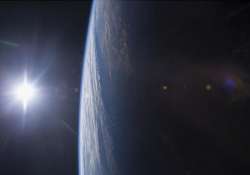Top 10 facts to know about Earth Day
Today is Earth Day – an annual event created to celebrate the planet's environment and raise public awareness about pollution. The day is observed worldwide with rallies, conferences, outdoor activities and service project.Here are some

Today is Earth Day – an annual event created to celebrate the planet's environment and raise public awareness about pollution. The day is observed worldwide with rallies, conferences, outdoor activities and service project.
Here are some interesting facts about this unique planet in our solar system:
The Great Barrier Reef off the coast of eastern Australia the largest coral reef in the world, but it's also the largest living organism in the world. The Great Barrier Reef stretches around 2,300 kilometres and spans about 344,000 square kilometres.
The mass of the Earth is about six billion trillion tons. That's 6 followed by 21 zeros.
While orbiting the Sun, the Earth is moving at a speed of about 66,611mph (107,200 km per hr). The Earth is constantly rotating close to 1,180 km/h, and our solar system is revolving around the galactic core around 800,000 km/h.
The hottest temperature ever recorded on Earth was in the aptly named Furnace Creek Ranch in California, which recorded a blistering high of 56.7 C. The lowest temperature ever recorded was in Vostok, Antarctica, where it was an icy -89.2 C. However, recent data suggests that the coldest temperature on our planet occurred in August 2010 when it was -94.7 C.
About 99 per cent of Earth's freshwater is in ice in Greenland and Antarctica. The Antarctic Ice Sheet measures almost 14 million square kilometres and has about 30 million cubic kilometres of ice.
Rainforests cover only two per cent of Earth, but they account for about 50 per cent of the Earth's plants and animals.
You are constantly falling into Earth. It's true: due to the mass of Earth, you are being pulled down, on average, at a rate of 9.8 metres per second squared.
The first Earth Day, on April 22, 1970, fell by coincidence on the 100th anniversary of Lenin's birthday, which led some Americans to denounce it as a communist plot.
The length of a day on Earth is increasing by about 17 milliseconds per century.